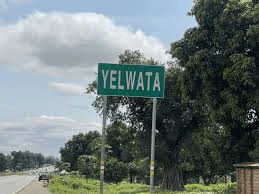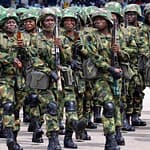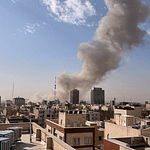The nation’s heartland, the very ‘Food Basket’ meant to nourish Nigeria, is staining its soil red. The phrase “Benue is bleeding” isn’t hyperbole; it is a visceral cry from communities facing relentless insecurity, a wound gaping wide. Now, from this landscape of fear and loss, a voice cuts through the noise. [Identify Ogwuche, e.g., “a concerned citizen,” “Barrister John Ogwuche,” etc.], in a direct, impassioned plea penned to the highest office, lays bare the crisis before President Bola Ahmed Tinubu. This isn’t just a letter; it’s an urgent, ink-stained demand echoing
Table of Contents
- The Anguish of the Middle Belt A Direct Appeal to the Commander-in-Chief
- Beyond the Bloodshed Unpacking the Systemic Failures Fueling the Crisis
- A Blueprint for Rescue Concrete Demands for Immediate and Lasting Action
- A Leadership Test Will Tinubu’s Response Bring Hope or Deeper Despair
- Future Outlook

The Anguish of the Middle Belt A Direct Appeal to the Commander-in-Chief
The earth trembles not from seismic shifts but from the hurried footsteps of those fleeing impending doom, a perpetual exodus etched into the dust of countless ravaged communities. In this heartland, where fertile grounds once promised abundance, the harvest now is grief and displacement. Villages stand as silent monuments to terror, their walls scarred by unimaginable violence, their hearths cold and abandoned. Children know the lullaby of gunfire better than nursery rhymes, and elders carry the weight of generations lost, their dreams withered like crops under a merciless sun. This is the grim tableau: a land suffocating under a blanket of fear, where the simple act of existing has become an act of profound courage. The cries for help rise not just from Benue but from a collective wound that spans the Middle Belt – a wound that deepens with every passing hour of inaction.
This is more than a humanitarian crisis; it is an assault on the very soul of a nation, a challenge thrown down at the feet of its leadership. The call echoing from voices like Ogwuche’s isn’t just a petition; it’s a desperate plea from a people cornered, asking if their lives hold value in the eyes of those sworn to protect them. The urgency cannot be overstated, the moment for deliberations has passed. What is demanded now is decisive, visible action. The list of critical needs is stark and immediate:
| Lives Lost | Uncountable Echoes |
| Homes Destroyed | Generations Erased |
| People Displaced | A Land of Wanderers |
| Future Dimmed | Potential Extinguished |
- Immediate Deployment of adequate, capable, and well-equipped security forces to hotspots, with clear mandates for offensive action.
- Establishment of Secure Return Corridors and provision of resources for internally displaced persons to safely return to their ancestral lands.
- Robust Intelligence Gathering and proactive measures to dismantle the networks fueling this violence.
- Justice and Accountability for perpetrators, sending a clear message that such atrocities will not go unpunished.
The anguish is real, palpable, and it demands a response commensurate with the gravity of the situation. The Commander-in-Chief holds the singular authority to turn the tide; the time to use it is *now*.

Beyond the Bloodshed Unpacking the Systemic Failures Fueling the Crisis
The cries from Benue echo beyond the immediate gunfire; they are a testament to deeper cracks in the foundations of governance and society. For too long, the conversation has been confined to troop deployments and temporary ceasefires, overlooking the insidious decay that fertilizes violence. We must confront the uncomfortable truth: the perpetual cycle of bloodshed isn’t merely a security lapse, but a symptom of interwoven failures spanning decades. These systemic cracks include:
- Governance Deficit: A persistent inability to address root causes like land disputes, resource competition, and ethnic mistrust with equitable solutions.
- Accountability Vacuum: The near-total absence of consequences for perpetrators, fostering a culture of impunity that emboldens further violence.
- Economic Exclusion: Deep-seated poverty and lack of opportunity, particularly for youth, creating fertile ground for recruitment into militias and criminal elements.
- Breakdown of Traditional Conflict Resolution: The erosion of local mechanisms for peacebuilding and dialogue, often sidelined by political interests.
Addressing this crisis demands shifting focus from reactive force to proactive foundational repair. It requires a deliberate, targeted approach that acknowledges the multifarious nature of the problem. Investing solely in military might without simultaneous commitment to justice, economic empowerment, and holistic community engagement is akin to patching a leaking dam with sticky notes. Leaders must look beyond the immediate carnage to the decaying infrastructure beneath – the failing institutions, the unimplemented policies, the abandoned development plans. Real security arrives not just through armed patrols, but through robust systems of justice, accountable leadership, and a pathway to dignity for all citizens. Consider the stark contrast between aspiration and reality:
| Area | Aspiration | Current Reality (in affected areas) |
|---|---|---|
| Justice System | Swift, Impartial Prosecution | Slow, Politically Influenced, Impunity |
| Economic Development | Inclusive Job Creation & Infrastructure | Neglected Infrastructure, High Unemployment |
| Community Trust | Strong Inter-Group Relations | Deep-Seated Suspicion & Division |

A Blueprint for Rescue Concrete Demands for Immediate and Lasting Action
The cries from the heartland are not whispers; they are roars of agony echoing across fertile plains now stained crimson. This isn’t a moment for abstract rhetoric or lengthy deliberations behind closed doors. It demands an immediate, decisive surge, a well-oiled machinery kickstarted into overdrive. We need more than empathy; we require engineers of stability, architects of recovery, armed with a clear, step-by-step strategy. Every single hour of delay translates into more lives lost, more futures shattered. The time for planning is over. The time for executing a vivid, tangible rescue mission is now.
This isn’t a wish list, but a non-negotiable directive from a people pushed to the brink. The initial thrust must be overwhelming, focused on establishing a bedrock of safety. Beyond immediate security surges, proactive measures are indispensable for long-term healing. These include:
- Rapid Deployment Force: Dedicated, well-equipped personnel specifically tasked with protecting vulnerable communities, not stretched thin across multiple unrelated duties.
- Justice Task Force: Swift, transparent investigation and prosecution of perpetrators, ensuring accountability breaks the cycle of impunity.
- Support & Rehabilitation Package: Comprehensive aid for displaced families, encompassing shelter, food, psychological support, and pathways to rebuilding livelihoods.
Furthermore, logistical clarity is paramount. The following resources are critically needed, not tomorrow, but today:
| Resource Need | Priority | Immediate Deployment By |
|---|---|---|
| Specialized Security Units | Urgent | Within 72 Hours |
| Humanitarian Aid Logistics | Critical | Immediately |
| Forensic Investigative Teams | High | Within 7 Days |
This is not a request for a temporary patch, but for the foundational pillars of a lasting peace, built on security, justice, and recovery.

A Leadership Test Will Tinubu’s Response Bring Hope or Deeper Despair
The cries from Benue have reached the highest office, funnelled through a bold, urgent letter from Ogwuche. This isn’t merely a routine plea; it’s a direct challenge, laying bare the raw wounds of a state under siege. For President Tinubu, this moment is a profound test of his leadership mettle. Does he possess the strategic vision, the political will, and the empathetic urgency required to staunch the bleeding and restore a semblance of peace? The weight of a nation’s hope, and the crushing potential for deeper despair, rests on his response. Ignoring, delaying, or offering insufficient measures would not only fail Benue but could significantly erode faith in the administration’s capacity to protect its citizens anywhere.
The response, or lack thereof, will write the next chapter for Benue and set a critical precedent for national security under this administration. The path chosen now dictates whether fields lie fallow out of fear or are tilled in renewed hope. The table below starkly contrasts the stakes:
| Area | Potential Outcome: Decisive Action | Potential Outcome: Inaction/Delay |
|---|---|---|
| Security Presence | Reinforced & Strategic | Sporadic & Ineffective |
| Humanitarian Crisis | Relief & Return Begins | Escalation & Deeper Displacement |
| Citizen Trust | Grows (Fragile but Present) | Further Erodes (Potentially Irreparable) |
| Future Outlook | Path Towards Recovery | Protracted Suffering & Uncertainty |
Benue awaits, wounds open, watching to see if this leadership test yields the swift, healing balm of effective governance, or the sharp, bitter edge of continued neglect. The silence or action from Abuja will speak volumes louder than any politically crafted statement, determining if hope springs anew or despair solidifies its grip.
Future Outlook
As the echoes of Ogwuche’s urgent plea reach the halls of power, the heart of Benue continues to bleed, a vivid reminder that time is both ally and adversary in this struggle. The ink that seals this letter is not just a call for help-it is a testament to the resilience of a people yearning for peace. Now, the onus lies with leadership to transform words into deeds, to stem the tide of violence and restore hope where darkness once held sway. For in Benue’s silent cries, there lies a message to the nation: security is not a privilege, but a right-and it is a right that must be fiercely protected, before more lives are lost to the shadows.














